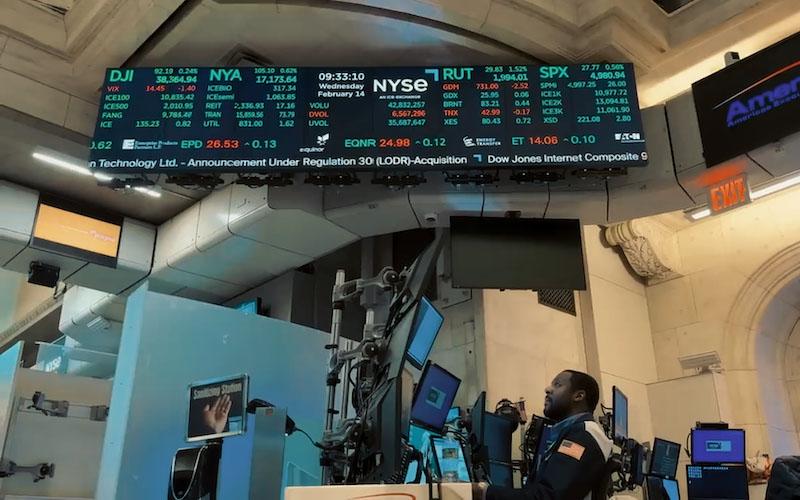IMF: Global inflation becomes more complex amid rising tariffs
2025-10-03 02:08:03

The global inflation situation is complex, with significant regional differences
Kozak noted that global inflation in 2025 will present a very different picture. Inflation will manifest differently in countries such as the United States, the United Kingdom, Australia, and India. US companies have absorbed much of the cost of the new tariffs by tightening profit margins, temporarily keeping inflationary pressures under control. US core inflation is estimated to be around 3.2% in the first half of 2025, slightly lower than the market expectation of 3.5%. However, overall inflation in the United Kingdom, Australia, and India is climbing rapidly, reaching 4.5%, 4.2%, and 6.1%, respectively, driven primarily by energy prices and supply chain bottlenecks.
In contrast, Asian exporters are experiencing subdued inflation, as global tariffs have weakened demand for their exports. This regional inflation disparity reflects the complex dynamics of the global economy under protectionism. While US businesses may be able to withstand cost pressures in the short term, consumers may face higher prices in the long term. Low inflation in Asian exporters could further hinder their economic recovery.
The global economy remains resilient, but signs of slowdown are emerging
Despite trade frictions and geopolitical tensions casting a shadow over the global economy, Kozak believes the global economy will demonstrate remarkable resilience in the first half of 2025. IMF data indicates that global GDP growth is expected to stabilize at 3.1%, the same as in 2024, thanks in part to post-pandemic supply chain repairs and fiscal support from various countries. However, recent data raises concerns: the Eurozone's manufacturing PMI fell to 48.9 in August, entering contractionary territory; and industrial production growth in emerging markets has also slowed to 3.9% from 4.8% last year.
Seth Carpenter, chief economist at Morgan Stanley, said: "The resilience of the global economy relies heavily on the momentum of a post-epidemic rebound, but tariffs and weak demand are eroding this foundation."
Kozak's remarks signaled that while the global economy hasn't stalled, signs of a slowdown cannot be ignored. For export-reliant countries, weakening external demand could make the coming years even more difficult, while developed economies must also be wary of a further loss of growth momentum.
How do US tariffs affect inflation? Short-term buffers can't mask long-term concerns
Regarding the situation in the United States, Kozak specifically noted that businesses' absorption of tariff costs has temporarily curbed inflation. According to the U.S. Department of Commerce, the import price index rose by only 1.8% in the first half of 2025, far below market expectations. This is due to businesses compressing profit margins to maintain market competitiveness. Data shows that U.S. corporate profit margins have fallen from 12.5% in 2024 to 10.8%.
Goldman Sachs economist James Harrison warned: "This strategy may reach its limits in 2026, and inflation may rebound rapidly once companies begin to pass on costs to consumers."
The IMF plans to delve deeper into the long-term economic impact of tariffs in its World Economic Outlook on October 14th and its Annual Review of U.S. Economic Policy in November. For now, American consumers haven't felt the direct impact of tariffs, but this lull may be just the calm before the storm. If tariffs continue to expand, the cost of a shopping cart for the average household could rise significantly.
The Fed's interest rate cut is timely, but inflation risks still need to be vigilant
Kozak welcomed the Federal Reserve's decision to cut interest rates in September, arguing that it was consistent with the weakening U.S. labor market and slowing inflation. Recent data showed that the U.S. unemployment rate rose to 4.2% in August, significantly higher than the 3.8% projected for 2024. Meanwhile, inflation has fallen from 3.5% last year to 2.6%, gradually approaching the Fed's 2% target. While she believes the rate cut provides breathing room for the economy, she cautions that there are still upside risks to inflation, such as energy price fluctuations or wage pressures.
Linda Goldberg, a former Federal Reserve economist, once said: "The Fed's interest rate cut is prudent, but the potential risk of inflation means they cannot be careless. The data in the next few months will determine the direction of policy." For the Federal Reserve, the challenge of balancing economic growth and inflation control remains considerable, and any disturbance may make the path of interest rate cuts more complicated.
The economic impact of the US government shutdown depends on its duration
Regarding the partial US government shutdown that began on October 1st, Kozak stated that the IMF is still assessing its impact. She noted that the consequences of a shutdown depend on its duration and how it is implemented. Historically, the 2013 and 2018 government shutdowns cost US GDP between 0.1% and 0.2%, respectively. If this shutdown lasts longer than two weeks, it could drag down economic growth by 0.3% in the fourth quarter of 2025.
Economist Paul Ashworth believes: "The short-term impact of the shutdown on consumer confidence and public services cannot be underestimated. The longer it drags on, the greater the threat to economic recovery."
Kozak hopes the US government can reach a compromise quickly to avoid greater economic disruption. After all, at a time when the global economy is slowing, domestic issues in the US could further undermine already fragile confidence.
Summary: The global economy stands at a crossroads
Kozak's remarks painted a complex picture of the global economy in 2025: diverging inflation, slowing growth, concerns about tariffs, monetary policy trade-offs, and political uncertainty within the United States all pose significant challenges. Data and analyst comments further reveal the deeper implications of these issues: US companies' cost-absorbing capacity may be merely a temporary fix, Asian exporters face export difficulties, and every move by the Federal Reserve and the US government could impact global markets. At this crossroads, the global economy requires closer policy coordination and more flexible response strategies to find a balance amidst uncertainty.
- Risk Warning and Disclaimer
- The market involves risk, and trading may not be suitable for all investors. This article is for reference only and does not constitute personal investment advice, nor does it take into account certain users’ specific investment objectives, financial situation, or other needs. Any investment decisions made based on this information are at your own risk.





















